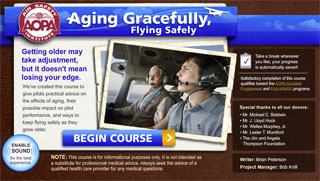 There’s no denying it: The pilot population is growing older. It’s a shift that poses real challenges for the industry, and raises important questions about GA safety. And eventually the question arises if you should be flying the same way you did when you were younger. How much does aging impact pilot performance? Does it affect certain skills more than others? And what’s the bottom-line impact on safety?
There’s no denying it: The pilot population is growing older. It’s a shift that poses real challenges for the industry, and raises important questions about GA safety. And eventually the question arises if you should be flying the same way you did when you were younger. How much does aging impact pilot performance? Does it affect certain skills more than others? And what’s the bottom-line impact on safety?
If you’re young at heart but concerned about the effect of aging on your flying ability and safety, examine the Air Safety Institute’s new report, Aging and the General Aviation Pilot: Research and Recommendations. The study looks to the past 20 years’ worth of scientific research on older pilots for answers. Based on a review of more than 30 published studies, the report summarizes both the overall impact of age, and effective ways pilots can minimize or delay any negative effects.
One of the key research insights reveals that different pilots experience the aging process very differently. In some respects this is an oversimplification, but it also reflects a basic truth we see around us in our daily lives: There is chronological age, and there is “true age,” and the two do not always correspond.
As pilots, we play a major role in making important, and sometimes difficult, decisions about our own fitness to fly. This is not a responsibility to be taken lightly. Together, this publication and its companion piece—the Air Safety Institute’s Aging Gracefully, Flying Safely online course—provide sound guidance to make good, well-informed choices.